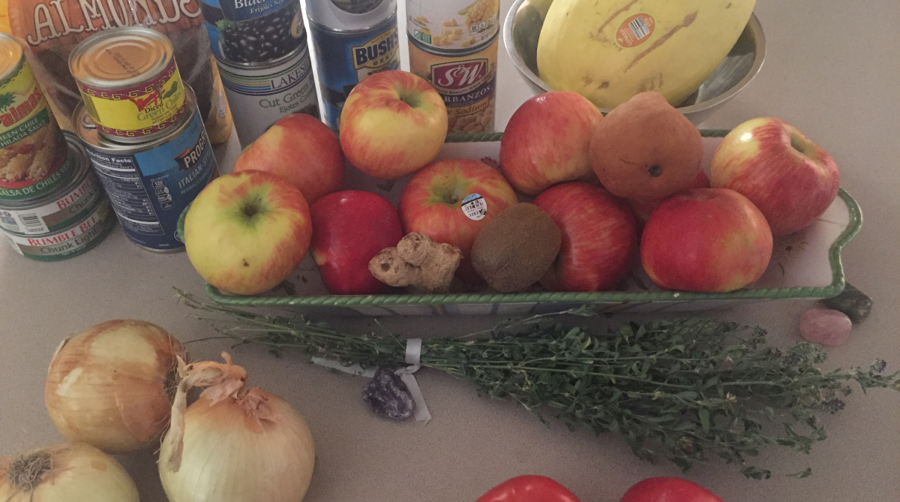Groceries add up fast! Using these 7 hacks to reduce your grocery bill is a simple way to cut the weekly expense. Putting the coupon clipping discussion aside these seven ideas work to cut your grocery bill without the time investment of couponing.
Shop Small and Often
Greens are a daily meal requirement, but they spoil faster than everything else. It’s not a good idea to buy too much at once. With spinach, for instance, I buy one bunch at a time because it gets funky. Because lettuce doesn’t have nutritional value, I use spinach for all my salads. With this in mind, shopping for produce twice per week allows for the freshest ingredients reducing the possibility of throwing produce away. Buying smaller helps to cut your grocery bill.

Leftovers are Meals Too
There are so many opinions about leftovers. Did you know the average American family wastes $2,200 on food each year? That’s enough for a short vacation! Let’s start with the huge pot of whatever—you know the one–that you don’t want to eat for three days straight. Thus, if you plan for all that abundance and freeze it in meal-sized containers, you are less likely to get sick of it and toss it. Better yet, these homemade freezer meals are perfect for busy week nights.
Depending on the meal, you might get a dinner and a lunch, or maybe just a dinner. The point is that if the meal is planned through its consumption, you are less likely to waste the food. Or my favorite, create a science project in the back of the fridge.
Bulk Shopping for Dry Goods
Assuming you have the space, buying in bulk saves long-term grocery dollars. We are all creatures of habit and tend to eat the same foods and use the same household products repeatedly. Planning a monthly visit to a bulk store is useful if you have specific items targeted. Warning! It is easy to overspend at these stores. I have specific can goods, like black beans, that I keep in my pantry. Always rotating the oldest to the front, I buy a few of these items each time I visit this store.
Meal Planning Focuses Purchases
Meal planning saves money and keeps you on track with your wellness goals. Most of us have a treasure chest of favorite recipes that we rotate through our kitchen. Dedicating one hour a week to plan meals and create a shopping list sets intentions success.
When shopping with a list, stick to it! All of those little items added to the cart add up. I’m sure you’ve heard that you shouldn’t shop hungry either. Danger! Buying exactly what you need keeps the grocery budge consistent.
Reduce Meat and Alcohol Purchases
Let me start by saying that I’m a carnivore that enjoys wine. Now, moving on. Meat and alcohol can absolutely kill your food budget. I’ll be honest about the wine. I budget for it outside of the food budget, so it doesn’t skew the amount we spent on food.
Incorporating a vegetarian night or two not only helps your food budget, but it also has gut health benefits. Additionally, using legumes such as black beans or veggies like green beans adds the fill-factor to your green meal. There are several veggies that mimic other foods when seasoned such as eggplant. At the very least reducing the red meat in exchange for chicken or turkey is easier on the wallet.
Choosing White Labels and Off Brands
Advertising does its job and sends us to the store with a specific brand in mind. However, many of the off brands have the same ingredients. In fact, most store brands are white label packaging of major brands. This isn’t always true, but it is mostly true. Give it a try. This one trick can knock a third off of your grocery bill. Imagine what that would look like for your entire list!
Use the Envelope System
Using the Dave Ramsey envelope system, you can budget for your monthly expenses and plan for cash payments. This might sound crazy in our digital society, but there is something to be said for the feeling of cash leaving your hand. With cards, whether credit or debit, the impact isn’t quite that immediate. Also, knowing that you are walking into the store with a set amount of cash keeps you focus on the planned list. It is much harder the throw extras in the cart when you don’t have the extra cash. The exercise of keeping a running total also encourages off brand shopping.
Saving money can be challenging with all the monthly expenses and unexpected surprises. Using these simple tips can cut your grocery bill adding a long-term benefit to your budget. Which of these tips will you use to trim your bottom-line?

















